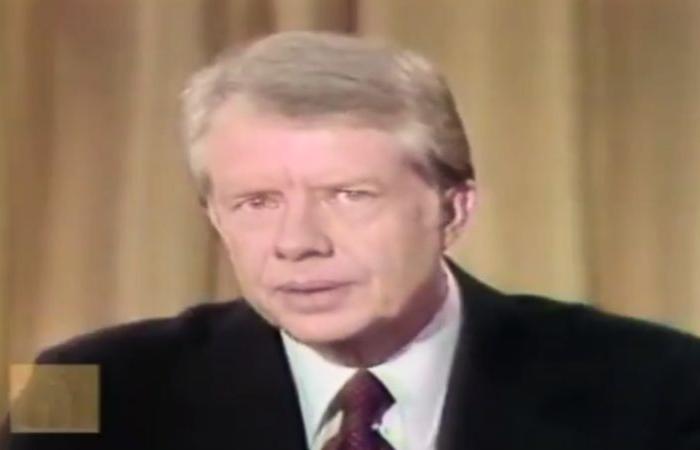
Screenshot of Jimmy Carter’s December 15, 1978 speech on establishing diplomatic relations with China. Miller Center on YouTube Channel.
Jimmy Carter, the former American President (1977 – 1981) and Nobel Peace Prize winner (2002), died on December 29, 2024, at the age of 100.
In the United States, he stands out as a leader who devoted his life to maintaining peace in the world, while respecting democracy, human rights and Christian values.
“An old friend of China”
The Chinese often referred to him as “China’s old friend”, thanks to the crucial role he played in severing ties with the Republic of China (ROC, also known as Taiwan) and establishing diplomatic relations between the United States and the People’s Republic of China (PRC) during his presidential term.
In response to the death of Jimmy Carter, Chinese President Xi Jinping, in his message of condolences to US President Joe Biden, praised the former leader’s diplomatic efforts. China’s Ambassador to the United States, Xie Feng, added that normalizing relations with China was “one of the most important decisions” Jimmy Carter ever made:
I would like to extend my sincere condolences to the family of President Jimmy Carter who considered establishing diplomatic relations with China one of the most important decisions of his life. His historical contribution… pic.twitter.com/CaCkczIZWb
— Xie Feng Xie Feng (@AmbXieFeng) https://twitter.com/AmbXieFeng/status/1873555031951036752?ref_src=twsrc%5Etfw
Diplomatic relations between the United States and the PRC were established through three communiqués, issued between 1972 and 1982.
Severance of relations with the Republic of China
The first communiqué was issued in February 1972, during the visit to China of the then American president, Richard Nixon, which aimed to bring the two countries closer together, against the backdrop of the breakdown of Sino-Soviet relations. In this jointly written document, the United States “recognizes” that “all Chinese people on both sides of the Taiwan Strait believe that there is only one China and that Taiwan is part of it.”
After the defeat of the Kuomintang (KMT) (the ruling party at the time) by the Chinese Communist Party (CCP) in the Chinese Civil War (1927–1949), its leaders fled to Taiwan while continuing to claim sovereignty over China.
The first statement specifies that it is up to the Chinese to “peacefully resolve” the question of Taiwan’s status.
The second communiqué, unveiled on December 15, 1978 and signed during the official visit of then Chinese Vice Premier Deng Xiaoping to the United States on January 1, 1979, consolidated Sino-American diplomatic relations. The diplomatic document confirms that the People’s Republic of China is the sole legitimate government of China and that Taiwan is an integral part of it. The same day, Carter officially severed all ties with the ROC by canceling the Mutual Defense Treaty between the United States and the Republic of China.
Carter’s decision will, however, be contested by members of the Senate and the American Congress who, on March 29, 1979, adopted a law on relations with Taiwan, guaranteeing de facto, but unofficial diplomatic relations and exchanges (including on the military) between Taiwan and the United States. The law will be signed by President Carter on April 10, 1979, and will take effect retroactively, effective January 1, 1979.
At the time, Carter’s diplomatic move sparked strong reactions from the Republic of China. The KMT’s official X account couldn’t help but mention this bitter historical moment in its condolence message:
We extend our condolences to the family of former President Jimmy Carter. Although in Taiwan he will be remembered for his decision to no longer recognize the Republic of China, we have great respect for his fight around the world for access to housing, conflict resolution, refugees and other causes.
— KMT KMT (@kuomintang) https://twitter.com/kuomintang/status/1873560974600655015?ref_src=twsrc%5Etfw
Old photos taken during protests featuring banners accusing Carter of betraying Taiwan are also resurfacing on social media platforms. One user, @Lovelifetaiwan, shared the historic photos on X (formerly Twitter), while noting that Carter’s decision did not hinder Taiwan’s democratization and development:
Former US President Jimmy Carter died today at the age of 100. Regarding the severance of diplomatic ties with the ROC, Jimmy Carter stated without hesitation that the decision to establish diplomatic relations between the United States and China was the right one, and that although it was not “entirely positive” for the people of Taiwan, what they regretted, they should not be held responsible for. He then added that over the past 20 years, the country’s democracy, human rights and economy had improved significantly, and that he had no need to apologize to Taiwan.
— ???????? (@Lovelifetaiwan) https://twitter.com/Lovelifetaiwan/status/1873589683839709623?ref_src=twsrc%5Etfw
In fact, some argue, Carter’s decision favored the democracy movement in Taiwan since the KMT military dictatorship had received U.S. support between 1949 and 1987.
President Carter’s Vision of Peace Under Threat
In January 2019, on the 40th anniversary of the release of the second communiqué, Jimmy Carter called the normalization of relations between the United States and China a “historic event” and said that he believed the decision would advance the cause of peace in Asia and the world.
Nevertheless, Carter’s vision is fading amid the escalating trade war between the United States and China, which has lasted since 2018, as well as territorial disputes in the Pacific region. Bao Pu, book publisher and son of former Chinese official Bao Tong, laments the loss of Carter, calling it “the end of an era”:
The honeymoon period between China and the United States dates back 50 years. President Carter’s attempt to make the promotion of human rights a key tenet of U.S. diplomatic relations with other countries failed. In fact, its policy of “double standards” is the source of many problems today. Deng’s political strategy [Xiao-ping]which was about hiding one’s strength, turned into a game of “showing your weapons” today and “hiding them” tomorrow.
— Bao Pu Bao Pu (@NewCenturyBaopu) https://twitter.com/NewCenturyBaopu/status/1873539696355414147?ref_src=twsrc%5Etfw
“Showing his guns” is a phrase frequently used by Xi Jinping to describe his iron fist policy, both diplomatically and domestically in combating the crackdown on corruption and dissidents.
Many foreign policy experts predict that after Donald Trump’s presidential inauguration on January 25, China-US relations will become more unstable and unpredictable, or at worst worsen.





